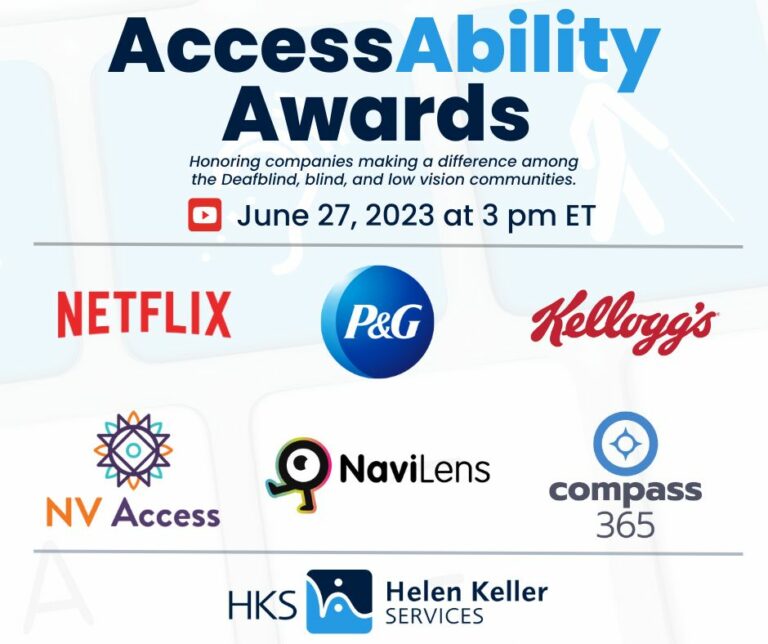
Helen Keller Services, a national non-profit working with individuals who are blind, have low vision, DeafBlind and/or have combined hearing-vision loss to live, work and thrive, this week hosted its 3rd Annual Access-Ability Awards recognizing companies, non-profits organizations and individuals doing work to support the individuals who are DeafBlind, blind or have low vision in a variety of ways.
The awards were timed to coincide with both the June 27t birthday of Helen Keller and with DeafBlind Awareness Week, celebrated June 25 to July 1.
The awards were hosted by Academy Award-nominated director Doug Roland, who wrote and created the 2019 short film “Feeling Through,” about a young man’s chance encounter with a DeafBlind man that changed his perception of the disability.
The awards were presented in a special virtual ceremony on Tuesday, June 27 at 3:00 – 3:30 p.m. EST and broadcast virtually on the Helen Keller Services website here.
“In recent years, we have observed significant advancements in fostering accessibility and inclusivity within the communities we engage with. However, there remains a substantial amount of work yet to be done,” said Sue Ruzenski, CEO of Helen Keller Services. “We are privileged to recognize the commendable efforts of these companies, as they utilize their skills and resources to enhance the accessibility and inclusivity of our society through their services, practices, products, and initiatives to promote workforce diversity.”
The recipients of this year’s Access-Ability Awards were:
- Navilens: This groundbreaking technology company has developed a system using your mobile camera to scan and get the necessary information contextualized throught the NaviLens accessible QR code, to enhance accessibility for visually impaired individuals, including those who are DeafBlind. NaviLens helps make cities smarter and more inclusive. The capabilities of the NaviLens code allow users to interact more easily and be accessible with their environment.
- Kellogg’s: As part of Kellogg’s Better Days®Promise commitment to inclusivity and accessibility, the company has incorporated NaviLens codes on the packaging of some of its most iconic cereals in the U.S. The technology allows blind, partially sighted, and DeafBlind people to find the boxes from a few feet away and hear information on the products using the NaviLens app on their smart phones. Kellogg is the first food company in the world to use NaviLens on product packaging.
- Procter & Gamble: P&G actively promotes accessibility and inclusivity in their products and work environment. Their commitment extends to the DeafBlind community, including Haircare brand Herbal Essences is one of the pioneers in (the accessibility) field, adding raised stripes to their shampoo bottles and raised circles to their conditioner bottles. P&G is setting the industry standard for superior packaging design — products that are both sustainable and accessible. They too have stated to use Navilens on packaging seeing the need to make it as accessable as possible.
- Netflix: Netflix is one of the world’s leading entertainment services with 233 million paid memberships in over 190 countries. Through expanding Audio Description and Subtitles for the Deaf and Hard of Hearing to be available in more languages and in more films and series, Netflix is working to create an entertainment experience for everyone regardless of language, device, connectivity, or ability, and connect members to their next favorite story.
- NV Access: Development of a groundbreaking screen reader called NVDA (NonVisual Desktop Access) for Windows computers..A not-for-profit software development company, that is revolutionizing technology access for the blind and vision impaired. Through their free and open-source screen reader, NVDA, blind and DeafBlind individuals are empowered worldwide. The nonvisual desktop access software is available in 175 countries, 55 languages and is used by 250,000 people worldwide. We thank NV Access for removing barriers and providing equal access to education, employment, and daily life for blind and vision-impaired people at no cost to the user.
- Compass 365: Compass365 is the SharePoint/Microsoft 365 services division of General Networks, an industry-leading IT systems integrator that delivers technology consulting to customers who need to manage and process business-critical information. As a Microsoft Gold Partner and employee-owned they had the opportunity to make HKS intranet accessible at Compass365 transforming organizations using SharePoint/Microsoft 365. With their expertise and dedication, they empower businesses to leverage technology, enhancing efficiency and effectiveness across industries and make it accessible for all. Helen Keller Services benefited directly when Compass helped make HKS’ new intranet, Helen’s Hub, accessible to blind and deafblind employees.
“The companies we are honoring have made remarkable strides in enhancing the quality of life for individuals who are DeafBlind, blind, and have low vision,” said Larry Kinitsky, Chairman of HKS. “We are sincerely thankful for the commitment of numerous companies in advancing accessibility, and we eagerly anticipate continued innovation in the times ahead, improved accessibility and look forward to more innovation in the future.”
The primary objective of DeafBlind Awareness Week is to foster a deeper understanding of the challenges faced by DeafBlind individuals and to celebrate their unique abilities and contributions to society. Throughout this week, various organizations and advocates host events and activities to increase public awareness and promote inclusivity and accessibility for DeafBlind individuals.
This year’s campaign focused on working-aged adults in the DeafBlind community, highlighting the Helen Keller National Center’s role in connecting them with employers. The theme for this year’s campaign is “OFFICE ROCKSTARS CAN BE DEAFBLIND!” Allies and supporters of the DeafBlind Community can show their support on social media by posting and using the hashtag #HKSDBAW2023 throughout the week.






